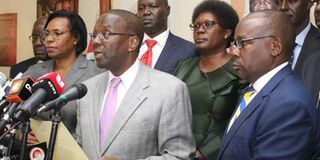Dissolve Supreme Court, top lawyers say amid crisis in Judiciary

Chief Justice Willy Mutunga with members of the Judicial Service Commission at the Supreme Court in Nairobi on January 27, 2016. Dr Mutunga leaves office in June and the graft allegations have threatened to taint the legacy of a man who came into the Judiciary so highly recommended. PHOTO | JEFF ANGOTE | NATION MEDIA GROUP
What you need to know:
- Dr Mutunga on Thursday sensationally revealed that even the election of judges’ and magistrates’ representatives were riddled with corruption, with the officials bribing others to vote for them.
- Justice Tunoi, Deputy Chief Justice Kalpana Rawal, and High Court Judge David Onyancha are embroiled in a case of their retirement ages.
The bribery allegations involving a Supreme Court Judge and the statement by Chief Justice Willy Mutunga that corruption was rife in the Judiciary have thrown the corridors of justice into unprecedented crisis of confidence.
A number of leaders have now called for the dissolution of the highest court in the land to restore faith in the justice system.
Dr Mutunga on Thursday sensationally revealed that even the election of judges’ and magistrates’ representatives were riddled with corruption, with the officials bribing others to vote for them.
The Judicial Service Commission has formed a team to investigate claims against Justice Philip Tunoi that he received Sh200 million bribe from Nairobi Governor Evans Kidero in a Supreme Court case challenging his election.
Justice Tunoi has denied the allegations terming them as a scheme to oust him before the 2017 elections, but critics have termed the new developments an irreparable damage on the image of the Judiciary.
“It is not possible that Justice Tunoi could have influenced the decision alone in a seven-judge bench case. If these allegations are found to be true, a completely new Supreme Court should be set up and start afresh as we head to an election year,” said Law Society of Kenya Chief Eric Mutua.
The Supreme Court handles presidential petitions as the last place of recourse, and cannot afford a crisis in confidence.
International Commission of Jurists George Kegoro insists that what was at stake wasn’t just the actual happening of the adverse allegations, but a matter of perception.
“Whatever its eventual outcome, the effect of the Justice Tunoi affair on the Supreme Court and the Judiciary, remains profound. The accusation against Justice Tunoi is an accusation against the entire court,” argues Mr Kegoro.
JUDICIARY AUDIT
Dr Mutunga two weeks ago called for a lifestyle audit on Judiciary officers, barely a week after completion of vetting of the officials, dampening hopes that the graft dragon in hallowed grounds of justice as finally being slayed.
“I think the most honourable and sensible thing for Justice Tunoi now is to resign. Given the seriousness of the allegations, even if not true, he should not wait,” said Senior Counsel Ahmednasir Abdullahi.
The LSK had in October, last year, argued that the Supreme Court should be disbanded, and the Court of Appeal take its place.
Dr Mutunga leaves office in June and the graft allegations have threatened to taint the legacy of a man who came into the Judiciary so highly recommended.
“Dr Mutunga feels like a lame duck. He wants to act, but his time has come and he can only do so much now. The issue of retirement, the upcoming election and then the bribery scandal has conspired to taint his retirement plan,” a senior Judiciary official told Saturday Nation on Friday.
Justice Tunoi, Deputy Chief Justice Kalpana Rawal, and High Court Judge David Onyancha are embroiled in a case of their retirement ages.
The vetting team, led by top lawyer Sharad Rao, has unearthed disturbing cases of financial impropriety as well as instances of judicial officers not able to explain sources of their income.
WHEAT AND CHAFF
In one instance, a magistrate had failed to withdraw a single cent from his salary account for two years, instead saying he lived on his wife’s Sh15,000-a-month salary.
Some analysts have argued that corruption was so pervasive in the Judiciary that it did not only need an audit, but a whole new purge akin to the Judges and Magistrates Vetting Board and the 2003 radical surgery combined.
Though Senior Counsel Paul Muite agreed that the lifestyle audit was important, he said it should be done by international firms.
“Addressing corruption in the Judiciary must be concurrent and with addressing it holistically across the board. Spotlighting the Judiciary alone cannot work.”
Senior Counsel Nzamba Kitonga, who chaired the team that drafted the Constitution 2010, said that the audit will weed out those that might have passed through the vetting team net.





